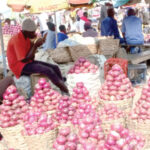‘Price crisis in Nigeria not over’
Malam Aliyu Isa Maitasamu is the National President of the National Onion Producers and Marketers Association of Nigeria (NOPMAN). In this interview, he stated why they are exporting onions to other African countries, how that will benefit their members and Nigeria, and why the country may continue to experience an onion price crisis. Excerpt:
Recently, we witnessed the first-ever documented onion export from the country by your association. What prompted that?
For several decades, there has been trans-Saharan trade between Nigeria and its neighbours, especially in those states that are in the border areas, like Sokoto, Katsina, Kebbi and the rest. We have been exporting onion to those countries, following the trans-Saharan routes. But we realised that there are enormous potentials and opportunities in the export of marketing or transaction which our government has not explored.
- Senate moves to whittle down IGP’s powers, decentralises police structure
- Don’t ignore flood alerts, FG warns states, others
Before now, if you said we would export onions, nobody will agree with you, because it was not in the records of the CBN or NBS, neither in the records of Customs or Nigeria Export Promotion Council or any of the agencies saddled with the responsibility of exports. But, we now think that it is time to pool our resources together, identify exporters of onion to countries like Niger, Ghana, Burkina Faso, Cote d’Ivoire, Mali and Senegal among others and see how we can encourage or support them to have a company. When they have a registered company, we will now encourage them to register with the Nigeria Export Promotion Council. When they do that, we will now ask them to open account with any commercial bank of their choice, after that, they would initiate their export exchange form, then look for a certified pre-shipment inspection agent, which currently we are using Angalia.
They will then use them to certify their goods. After they have done that, they will issue the certificate. Then they will look for a Customs Licensed Agent, to help them clear their goods with Customs, through a Single Goods Declaration Form (SGD). Once that is done, then you will take all your papers and go.
It is very easy compared to the informal way of exporting, because, by using the informal way, we incur too many expenses. There are lots of roadblocks, a lot of hurdles, a lot of risks etc. But, when you do your documented export, you have your Certificate of Origin and Certificate of Movement, together with the SGD and the rest. Then, you have the potential to move your goods from Sokoto to any country, without any problem or anybody harassing you. And I think that is the reason.
Many may want to know where our onions are taken to and whether you are sure of having off-takers so that your efforts would not be in vain?
Our destinations, for now, are Kasuwan Dole in Niamey, Niger Republic, markets in Accra, Ghana, Abidjan, Burkina Faso, Mali and Senegal. In most of these West African countries, we feed them with our onion.
Just last year, the Indian High Commission in Nigeria wrote to us that we should supply them with onions and you know that India is the second-largest onion producing country. But they ran out of onion and wanted Nigeria to supply them onions. We accepted their offer and we are currently working to see how we can start exporting onions to India.
So, there is huge potential in the onion value chain and we are calling on the elite and all stakeholders to come and see how we can improve each of the chains, so that the whole structure will improve, right from the production, marketing and even the consumption.
Some people view your decision as part of measures to boycott markets in southern Nigeria because of what happened in Sasha market where many of your members were allegedly killed and their goods destroyed. How will you react to this?
I have said it many times; that claim is not true. We have been doing this trans-Saharan trade for centuries. It started long, even before our fathers. All we did was formalise it because it was done informally in the past. Now we said, let us come together so that we can benefit more. And we want the government to benefit, we want our people to benefit. That is why we engaged ourselves in the formal way of exporting, by meeting all the criteria and requirements for export and with the support of the Nigeria Customs Service, Sokoto Area Command, in terms of training and technical support, it was very easy for us to succeed.
So, we are calling on other Nigerians and government agencies that are in the position to help, to please do so, to bring a lasting change to this country, especially this kind of change that will create more jobs, help the country in terms of forex and improve the GDP of the country. This will help to curb insecurity in the country.
In your remarks during the flag-off, you said there was a global onion crisis and in Nigeria, the situation was compounded by the flood disaster experienced last year and the COVID-19 pandemic. Now that you’ve decided to export this commodity, don’t you think you are doing more harm to your country than good?
I doubt if this will worsen the situation in the country. We are left with no choice. If I produce my onion and I can’t store it, what do you expect me to do? Should I take it and flood Lagos markets with it to the extent that no one can buy them all? I explore other markets such that even if I don’t make a profit, at least, I will have a return on my investment on the farm. So, it is not the issue of selling to other countries, the issue is that if we don’t export, how do we manage it? We don’t have storage facilities, we don’t have processing plants and when you keep your onion without storage facility, it will get rotten. About 50 to 60 per cent of our onions are lost in the post-harvest period.
We can’t continue like that. We need to look for a market. If the government can provide us with storage facilities, this kind of crisis will reduce drastically, whereby we will have our onion all-year-round.
So exploring international markets at this time is the only option we have. We are not boycotting any market. Onion is all over the country. So, there is no such boycott. We are one Nigeria.
About three months ago, the price of onion shot through the roof following scarcity of the produce in the country. As a stakeholder, what do you think can be done to ensure stability in the price of onion in the country?
One, the government should support onion farmers through the CBN interventions, either by the Commodity Anchor Borrowers, the Prime Anchor Borrowers, or any other facilities that are available that the onion farmers can tap into.
Two, the government should encourage the construction of model storage facilities, especially in onion producing areas like Sokoto, Kebbi, Kano, Gombe, Katsina and Kaduna because the onion that is stored can serve the period of scarcity. The facility will also help a lot in reducing the extent of exportation.
The onion crisis is a yearly affair. There will be another crisis this year. This is because this year, farmers planted their onion too early, because of the increment in prices late last year. They started harvesting their onion in January and February and because of this, the price crashed. And unfortunately, the onion they harvested within that period was not the storage variety; it cannot be stored. You just have to sell it. And for them now to engage in dry season production which is the storage variety, they cannot meet up with the time factor, because it is seasonal. So, there is low production in terms of onion that they will store to serve the scarcity period.
Additionally, a lot of farmers were unlucky. They used the local variety which is not good seeds, we call it ‘Mugun iri’ in Hausa language, because if you plant it, apply fertiliser and everything at the end of the day, it will still not form a bud. Such a scenario is what happens mostly now. Currently, we are battling with a lot of cases of some local seeds producers who have sold bad seeds to farmers.
Even from the storage types of onion that are available, half of them would go to waste because they used the ‘Mugun iri’ or bad seeds. They too need to be sold immediately, because they can’t be stored.

 Join Daily Trust WhatsApp Community For Quick Access To News and Happenings Around You.
Join Daily Trust WhatsApp Community For Quick Access To News and Happenings Around You.

